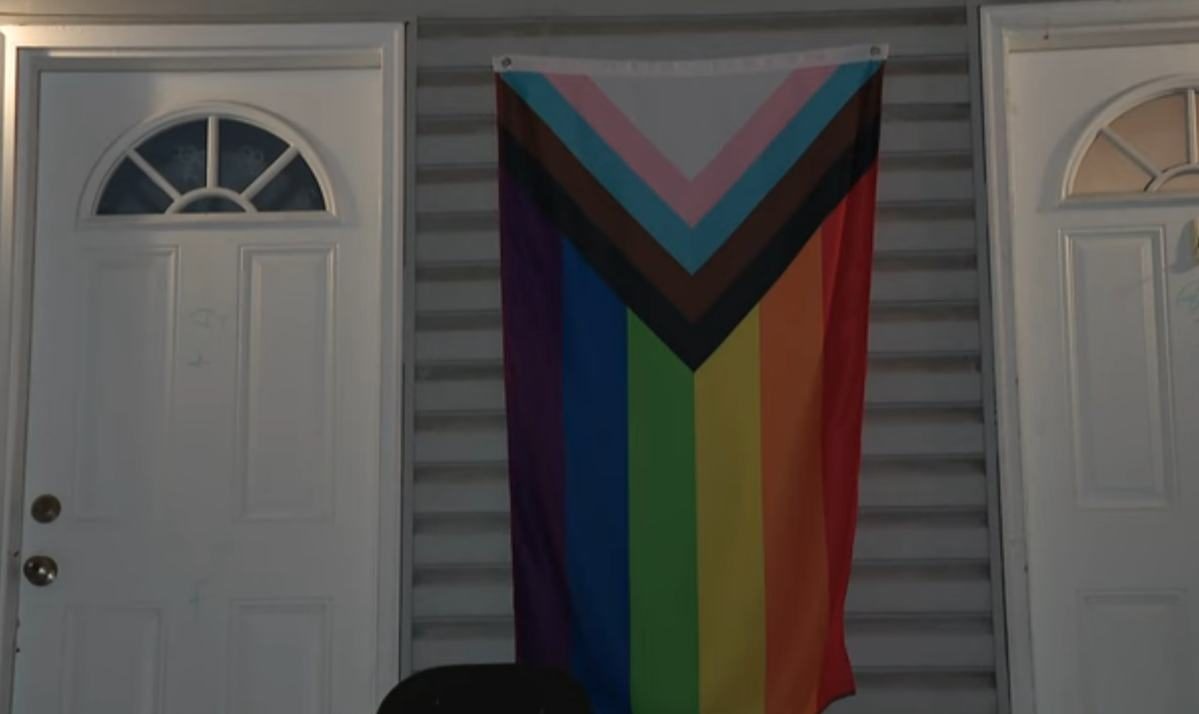Ohio
Ohio LGBTQ+ nonprofit’s nationwide ‘messages of love’ campaign
A LGBTQ+ nonprofit based in Ohio – wants to spread “messages of love” with a billboard campaign across the country

DAYTON, Oh. – With LGBTQ+ advocates bracing for a record number of anti-Trans bills in 2022, Have a Gay Day – an LGBTQ+ nonprofit based in Ohio – wants to spread “messages of love” with a billboard campaign across the country.
So far, over 20 billboards are up and running in states like Ohio, Texas, Florida, Virginia and Tennessee – with plans to expand the campaign further, said the group’s founder and executive director, Michael Knote.
“YOU ARE LOVED,” reads one billboard, while another shares this message: “Be careful who you hate, it could be someone you love.”
“With all the money that is being spent against the community itself, we thought about what would be the best way to combat that? And we thought, why not put up a couple billboards of support for the community – just to say that we love you, we accept you,” Knote told the Blade.
Have a Gay Day – partnering with Trans artist Rae Sengrighi, who donated some of the artwork – wants to get as many billboards in as many places as possible, Knote said while acknowledging that Texas and Florida were on the forefront.
In Texas, Republican Gov. Greg Abbott issued a directive requiring state agencies to investigate gender-affirming care as “child abuse,” while mandating licensed professionals and general citizens report the procedures or face “criminal penalties.”
Though a judge blocked the DFPS from investigating parents and families of Trans youth, Texas Attorney General Ken Paxton announced on Twitter that he filed an appeal, freezing the judge’s order. “Much-needed investigations proceed as they should,” he said. “This fight will continue up to the Supreme Court. I’m ready for it.”
Meanwhile, Florida is at the forefront of anti-LGBTQ+ legislation in the country, with the so-called “Don’t Say Gay” bill – which would would ban classroom instruction about sexual orientation and gender identity in grades K-3, while “age-appropriate” teaching would be allowed in older grades – is now awaiting approval from Republican Gov. Ron DeSantis.

But legislative attacks on the LGBTQ+ community, particularly Trans youth, have appeared in statehouses across the country – from Georgia and Alabama to South Dakota to Idaho. Some advocates fear this year will be even worse than the last, where a record number of anti-LGBTQ+ legislation was introduced at the state level.
“It’s horrifying,” Knote said, adding that “someone has to say that there is support, there is love that’s out there.”
School board meetings in Knote’s home state of Ohio initially sparked the idea for the now nationwide billboard campaign, he said. Knote sat in on meetings around his home city of Dayton, saying he listened to people “hate on the transgender community for hour after hour.”
Overall, Knote is happy to see his campaign’s impact and excited to see where it will go. “It’s become a movement,” he said.
Ohio
Ohio Supreme Court allows hold to continue on trans care ban
“The state’s claim that this was an ‘emergency’ because it could not enforce an unconstitutional statute was utterly absurd”

By Megan Henry | COLUMBUS, Ohio – The Supreme Court of Ohio rejected a request by the state to narrow a temporary restraining order against Ohio’s gender-affirming care ban for trans youth.
Wednesday’s decision allows the case to continue in the Franklin County Court of Common Pleas, where a trial is scheduled for July 15.
“This decision was correct,” Freda Levenson, ACLU of Ohio’s legal director, said in a statement.
“The state’s request was egregious. The scope of the temporary restraining order was necessary and appropriate to prevent the constitutional violations and other irreparable harm that would immediately occur if HB 68 were permitted to take effect. Our legal battle will continue until this cruel restriction is permanently overturned.”
The ACLU of Ohio filed a lawsuit in the Franklin County Court of Common Pleas on March 26 against the portion of House Bill 68 that prohibits gender-affirming care for transgender youth. The lawsuit said HB 68 violates four sections of the Ohio Constitution — the single-subject rule, the Health Care provision, the Equal Protection Clause, and the Due Course of Law provision.
The lawsuit was filed on behalf of two families whose 12-year-old transgender daughters would lose access to gender-affirming health care.
Franklin County Court of Common Pleas Judge Michael Holbrook issued the temporary restraining order on all of HB 68 on April 16. In addition to preventing transgender youth from starting hormone therapy and puberty blockers, the bill also prevents trans athletes from playing middle and high school sports.
On April 22, Ohio Attorney General Dave Yost filed an emergency motion with the Ohio Supreme Court to try to stop the restraining order — arguing Holbrook “acted beyond the scope of his powers.” He also said the injunction is illegal since it applies to all of Ohio, not just the two plaintiffs.
“The state’s claim that this was an ‘emergency’ because it could not enforce an unconstitutional statute was utterly absurd,” Harper Seldin, American Civil Liberties Union’s senior staff attorney, said in a statement.
“Far from creating an emergency, the challenged temporary injunction merely maintains the status quo in Ohio – that trans youth be permitted to access life-saving medical care with support from parents and doctors.”
HB 68 was supposed to take effect April 24. Ohio Gov. Mike DeWine vetoed HB 68, but lawmakers voted to override his veto.
In two separate concurring opinions, Republican Ohio Supreme Court Justice Pat DeWine and Democratic Ohio Supreme Court Justice Jennifer Brunner took shots at one another.
“Although we deny the relief requested today, this case raises an important issue: Is it appropriate for one judge in a single county to issue a statewide injunction that goes beyond what is necessary to provide interim relief to the parties in the case,” Justice DeWine questioned.
“The other concurring opinion in this case offers a full-throated defense of universal injunctions and fulminates against this court ever taking up the issue. Unlike the other concurring justice, I will reserve judgment until we are presented with a case that properly presents the issue and we have had the benefit of adversarial briefing. … This court should address the propriety of the issuance of universal injunctions for the purpose of granting interim relief in an appropriate case.”
Justice DeWine was joined by Justices Patrick Fischer and Joseph Deters in his concurrence.
In her own concurrence, Justice Brunner took issue with Justice DeWine’s citation of a recent U.S. Supreme Court ruling.
“A stay is not an injunction. The Ohio Constitution, unlike the federal Constitution, has a single-subject rule for legislation that results in multi-subject legislative acts being facially unconstitutional,” Brunner wrote. “The very nature of a facial constitutional violation is that the offending law violates the Constitution in every circumstance.”
Brunner wrote that if a law that is facially unconstitutional may not be applied to an individual, then it may not be applied to anyone else.
“Similarly, a temporary restraining order based on a substantial likelihood that a law is facially unconstitutional may not be limited to just the parties in the case. Moreover, when the court hearing such a challenge has jurisdiction over the state as a party-defendant, it has the power to enjoin the state from applying the law, regardless of the law’s subject matter.”
Brunner then explained why she chose to write her own concurrence in the first place.
“My colleague’s concurring opinion is more akin to a political statement than a legal one, which is why I have written this opinion,” Brunner concluded.
Gender-affirming care is supported by every major medical organization in the United States. Children’s hospitals across Ohio, the Ohio Children’s Hospital Association, and the Ohio Academy of Family Physicians all opposed HB 68.
******************************************************************************************

Megan Henry is a reporter for the Ohio Capital Journal and has spent the past five years reporting in Ohio on various topics including education, healthcare, business and crime. She previously worked at The Columbus Dispatch, part of the USA Today Network.
Follow OCJ Reporter Megan Henry on X.
******************************************************************************************
The preceding article was previously published by the Ohio Capital Journal and is republished with permission.
The Ohio Capital Journal is an independent, nonprofit news organization dedicated to connecting Ohioans to their state government and its impact on their lives. The Capital Journal combines Ohio state government coverage with incisive investigative journalism, reporting on the consequences of policy, political insight and principled commentary.
We’re part of States Newsroom, the nation’s largest state-focused nonprofit news organization.
Ohio
Anti-trans bills see recent movement in the Ohio Statehouse
The Ohio House has four more meetings scheduled in this month and June before the lawmakers go on summer break

By Megan Henry | COLUMBUS, Ohio – Two anti-transgender bills have recently been moving through the Ohio legislature.
House Bill 8 would force educators to out a student’s sexuality to their parents, require public schools to inform parents about sexuality content materials ahead of time and give them the option to request alternative instructions. The bill passed in the House over the summer and has had a few hearings in the Senate Education Committee — meaning it will likely be voted on soon.
House Bill 183 would ban transgender students from using the bathroom and locker room that matches up with their gender identity. The bill was recently voted out of committee but hasn’t made its way to the House floor yet and doesn’t seem like it will anytime soon.
“We haven’t formally discussed it and it won’t be on the floor next week,” said Ohio House Speaker Jason Stephens, R-Kitts Hill.
The Ohio House has four more meetings scheduled in May and June before the lawmakers go on summer break.
Having these bills go through the legislative process — even if they don’t pass — is damaging to the LGBTQ community, said Carson Hartlage, a member of the Board of TransOhio.
“They’re both framed as attempts to protect students … but it doesn’t seem like these bills are actually fixing any real problems,” Hartlage said. “They’re really just creating really harmful conversations around trans kids and a lot of them don’t really seem all that practical or enforceable. … It just creates a spotlight where we don’t really need one and points out kids or individual schools or things like that don’t really need that kind of negative attention.”
Bathroom bills
Bradie Anderson, 14, is worried someone will police which bathroom she uses at school.
“There’s no problem with her in the bathrooms,” Bradie’s mom Anne Anderson said. “There’s just not. They’re looking for a solution to a problem that doesn’t exist.”
The Anderson family lives in Mentor, but they have considered moving because of the various anti-LGBTQ bills in the Statehouse.
“People don’t want to stick around here,” Anderson said.
Ten states have laws on the books that limit access to bathrooms that line up with gender identity in K-12 schools, according to the UCLA Williams Institute 2024 report on the impact of anti-transgender legislation on youth. An estimated 34,800 transgender students ages 13-17 live in those states.
Those laws have been challenged in Florida, Oklahoma, Idaho and Tennessee. Seventeen states, including Ohio, have bathroom bill bans pending in the legislature.
Ohio’s bill would also ban schools from allowing students to share overnight accommodations with the opposite sex, and it would prevent a school from having single-occupancy facilities.
Parental bill of rights
Anderson worries about the LGBTQ students whose parents don’t support them.
“Those are the kids that are going to be completely crushed by House Bill 8,” she said. “House Bill 8 would be very dangerous to children that want to keep a low profile and feel that they can trust someone in their school because they obviously don’t feel safe coming out to their parents, that’s the issue.”
There were 62 parental-rights bills in 24 states in 2023, according to FutureEd, an independent think tank at Georgetown University’s McCourt School of Public Policy.
Bills have been signed into law in Florida, Arizona, Georgia, and Louisiana.
Ohio’s bill would prohibit any sexuality content from being taught to students in kindergarten through third grade.
The bill defines sexuality content as “oral or written instruction, presentation, image, or description of sexual concepts or gender ideology.”
******************************************************************************************

Megan Henry is a reporter for the Ohio Capital Journal and has spent the past five years reporting in Ohio on various topics including education, healthcare, business and crime. She previously worked at The Columbus Dispatch, part of the USA Today Network.
******************************************************************************************
The preceding article was previously published by the Ohio Capital Journal an is republished with permission.
The Ohio Capital Journal is an independent, nonprofit news organization dedicated to connecting Ohioans to their state government and its impact on their lives. The Capital Journal combines Ohio state government coverage with incisive investigative journalism, reporting on the consequences of policy, political insight and principled commentary.
We’re part of States Newsroom, the nation’s largest state-focused nonprofit news organization.
Ohio
Ohio court temporarily blocks gender-affirming care ban
“Today’s ruling is a victory for transgender Ohioans & their families. The ban is an openly discriminatory breach of rights of trans youth”

COLUMBUS, Ohio – Today, the Franklin County Court of Common Pleas issued a temporary restraining order to prevent the ban on gender-affirming care for transgender youth from taking immediate effect.
A new lawsuit filed by the ACLU of Ohio alleges that the ban on gender-affirming care, passed into law earlier this year, violates multiple provisions of the Ohio state Constitution.
This action comes in the wake of a decision by the 6th Circuit Court of Appeals, under which Ohio falls, that dismissed federal constitutional concerns regarding bans on gender-affirming care for transgender youth. This latest legal challenge, however, focuses on the Ohio state Constitution and is filed in the Franklin County Court of Common Pleas.
According to the recently released filing, attorneys argue that a state constitutional amendment, passed by Republicans in 2011 to prevent the implementation of the Affordable Care Act (Obamacare), may, in fact, make the ban on gender-affirming care for transgender youth unconstitutional.
In 2011, Republicans in Ohio voiced concerns that the Affordable Care Act would limit healthcare choices. Misinformation about “death panels” became widespread nationally. At the same time, there was controversy over whether individuals could retain their doctors under the new federal healthcare program. In reaction, Ohio Republicans and the local Tea Party, a then-active anti-Obamacare movement within the Republican Party, advocated for a constitutional amendment to prohibit penalties related to the purchase of healthcare or health insurance. The amendment was approved by popular vote and took effect shortly thereafter.
The amendment reads as follows:
(B) No federal, state, or local law or rule shall prohibit the purchase or sale of health care or health insurance.
(C) No federal, state, or local law or rule shall impose a penalty or fine for the sale or purchase of health care or health insurance.
Now, in the latest lawsuit filed by the ACLU, attorneys argue that the new gender affirming care ban for transgender youth set to go into effect on April 24th violates these constitutional protections in the state. In the lawsuit, attorneys argue that “gender-affirming care, including the prescription of puberty-delaying medication and/or hormone therapy to minor patients where appropriate in the judgment of a physician, is ‘health care’ within the meaning of Article I, Section 21.” They argue that the law imposes penalties and prohibits the purchase of health care, rendering it unconstitutional.
The plaintiffs, represented by the American Civil Liberties Union, the ACLU of Ohio, and the global law firm Goodwin Procter, successfully argued that the plaintiffs are likely to win their claim that House Bill 68 violates the Ohio Constitution because it covers more than one single subject.
The Court enjoined the Health Care Ban as well as a ban on transgender girls participating on girls or women’s sports teams that was also contained within House Bill 68.
In a statement the ACLU said that the group will continue the litigation to ultimately obtain a permanent injunction on behalf of Ohio families whose children are at risk of losing critical life-saving medical care.
The temporary restraining order is in effect for 14 days or until the hearing of plaintiffs’ motion for a preliminary injunction, whichever is sooner. HB 68 was originally set to take effect on April 24.
“We are thrilled and relieved that Ohio’s ban on gender-affirming health care has been halted and that transgender youth can continue, for the near term at least, to access medically necessary healthcare,” Freda Levenson, Legal Director for the ACLU of Ohio, said. “Our legal battle will continue until, we hope, this cruel restriction is permanently blocked. Ohio families have a constitutional right to make personal healthcare decisions without government intrusion.”
Harper Seldin, an ACLU Staff Attorney noted:
“Today’s ruling is a victory for transgender Ohioans and their families. Ohio’s ban is an openly discriminatory breach of the rights of transgender youth and their parents alike and presents a real danger to the same young people it claims to protect. We are committed to opposing this law until it is permanently overturned, making Ohio a safer place to raise every family.”
Allison DeLaurentis and Miranda Hooker, Complex Litigation & Dispute Resolution Partners, for the law firm of Goodwin Procter said:
“Today’s ruling not only upholds the rights of transgender individuals but also champions the principle that healthcare should be accessible, and above all, inclusive.”
Additional reporting by Erin Reed
Ohio
Trans student bathroom ban bill passes Ohio House Committee
HB 183 would require Ohio K-12 schools & colleges mandate students only use bathroom or locker room that matches their sex assigned at birth

By Megan Henty | COLUMBUS, Ohio – A bill that would ban transgender students from using the bathroom and locker room that matches up with their gender identity passed out of the Ohio House Higher Education Committee Wednesday by a 10-5 party line vote.
State Reps. Beth Lear, R-Galena, and Adam Bird, R-New Richmond, introduced House Bill 183 which would require Ohio K-12 schools and colleges to mandate that students could only use the bathroom or locker room that matches their sex assigned at birth. It would also prohibit schools from allowing students to share overnight accommodations with the opposite sex.
HB 183 now awaits further consideration in the House, which is next scheduled to be in session April 24.
Parents, grandparents, and school superintendents asked Bird for this bill, he said.
The American Medical Association officially opposes policies preventing transgender individuals from accessing basic human services and public facilities consistent with gender identity.
HB 183 would not prohibit a school from having single-occupancy facilities and it would not apply to someone helping a person with a disability or a child younger than 10 years old being assisted by a parent, guardian, or family member.
State Rep. Gayle Manning, R- North Ridgeville, thought about bringing an amendment to the committee that would have carved colleges and universities out of the bill, but she decided against it.
“I’m hopeful we will continue to have these discussions on the removal of higher ed,” she said. “The reason being, we’re talking about adults. Universities are similar to a city with the number of students that they have. Frivolous lawsuits that will increase the cost of tuition eventually and the cost of our families.”
Manning voted in favor of the bill even though she hopes lawmakers can continue conversations to “find a better solution.”
Bird opposes taking the higher education component out of the bill.
“The reason I oppose that is because we have college credit plus in Ohio,” he said. “We seventh graders going to college, kids in high school going to colleges and in that college environment, we got to make sure they are protected.”
State Rep. Joe Miller, D-Amherst, vocalized his disdain for the bill before the committee voted.
“Here we are again … taking away school districts and colleges’ ability and their leadership to make decisions that are best for providing safe, equitable access for all Ohio students,” Miller said. “I hope that this doesn’t see the floor and doesn’t see the governor’s desk.”
More than 100 people submitted opponent testimony on HB 183 and more than 30 people submitted proponent testimony.
“We do love and care about all kids,” Bird said when asked about all the backlash the bill has received. “Me and my Republican colleagues have heard from constituents all across the state. They may not have been loud. They may not have been vocal. They may not have come with a sign to the Statehouse, but we are here representing the vast majority of Ohioans who want protections.”
Trans advocates speak out against HB 183
Transgender advocates hosted a press conference following the House Higher Education Committee to voice their opposition to HB 183. Trans Ohio Board Member Carson Hartlage said HB 183 is harmful to all students, including cisgender students.
“Most trans non binary and gender non conforming students only begin using restrooms that align with their gender identities after they’ve experienced some form of trauma when using a restroom that aligns with their sex assigned at birth,” Hartlage said.
Thirty percent of LGBTQ+ students said they were prevented from using the bathroom that aligned with their gender, and 26% were stopped from using the locker room that aligned with their gender, according to Ohio’s 2021 state snapshot by GLSEN, which examines the school experiences of LGBTQ middle and high school students.
When looking specifically at transgender and nonbinary students, 42% were prevented from using the bathroom that aligned with their gender and 36% couldn’t use the locker room that aligned with their gender, according to the Ohio GLSEN report.
Ohio’s first openly transgender public official and member of the Gahanna-Jefferson Public Schools’ Board of Education Dion Manley shared his concerns.
“As a trans man is I’ve been going into men’s restrooms for 25 years without incident,” Manley said. “I go visit the schools on a regular basis. So these legislators want me to go into a girls restroom in the elementary school, middle school, and high school.”
Mallory Golski, civic engagement and advocacy manager at Kaleidoscope Youth Center, said how Ohio was recently at the center of history in a positive way with Monday’s eclipse.
“We’re here reflecting on how we’re at the epicenter of another piece of history,” she said. “And unfortunately, we’re at the wrong place at the wrong time. Unlike the fleeting blackout of the total solar eclipse, the history I’m talking about here today at the statehouse leaves transgender youth in the dark.”
Jeanne Ogden’s daughter would be directly impacted by this bill. Her daughter’s college classroom building does not have single-use restrooms in the building, forcing her daughter to go across the street to use the restroom.
“These kids getting bullied and yes, their mental health is suffering,” said Ogden, the executive director of Trans Allies of Ohio. “Trans people are tired. Parents are exhausted.”
******************************************************************************************

Megan Henry is a reporter for the Ohio Capital Journal and has spent the past five years reporting in Ohio on various topics including education, healthcare, business and crime. She previously worked at The Columbus Dispatch, part of the USA Today Network.
******************************************************************************************
The preceding article was previously published by the Ohio Capitol Journal and is republished with permission.
The Ohio Capital Journal is an independent, nonprofit news organization dedicated to connecting Ohioans to their state government and its impact on their lives. The Capital Journal combines Ohio state government coverage with incisive investigative journalism, reporting on the consequences of policy, political insight and principled commentary.
We’re part of States Newsroom, the nation’s largest state-focused nonprofit news organization.
Ohio
As drag goes ‘mainstream,’ some red states look to restrict them
Most Americans oppose bans, but Republicans keep filing drag-related bills at a time when drag has become a form of mainstream entertainment

By Amanda Hernández | COLUMBUS, Ohio – Drag performances used to be found mostly in the confines of nightlife venues such as clubs and bars.
But drag has stepped into the daylight, with elaborately costumed and made-up performers appearing at library readings and kid-friendly brunches, and a newfound visibility for gender-bending entertainment and self-expression.
“Drag now versus 15 years ago is like night and day,” said Dr. Lady J, a Cleveland-area performer with a doctoral dissertation in drag history. “Drag is so mainstream now. … I grew up in a world where drag queens were this mysterious thing that maybe existed in New York or San Francisco.”
The growing visibility has made drag performances a target for conservative legislators. Although polls show most Americans don’t support laws to restrict drag performances, lawmakers in states including Ohio, Kentucky, Missouri, Nebraska, South Dakota and West Virginia have considered or enacted legislation this session that would prohibit businesses from allowing minors to attend drag shows. Several would impose stricter business regulations on establishments that host drag shows or would ban “obscene live conduct” at state universities.
Two Ohio Republican lawmakers have introduced legislation that would ban drag performers from working anywhere that isn’t designated as an adult entertainment facility. The way the law is written, it would also appear to ban any theatrical performance where a character wears clothing opposite gender at birth.
Supporters of these bills say they are designed to protect children from entertainment that is not appropriate for them, not to target the transgender community. But critics warn that such laws could be used to file criminal charges or discriminate against people who identify as transgender outside of drag performances. This year, 21 drag-related bills have been considered in 12 states, according to the ACLU’s LGBTQ+ bill tracking database. (Some were carried over from last year’s legislative sessions.)
Most of them failed. Of 15 drag bills considered last year, only three were carried over to this year’s legislative sessions, according to the ACLU’s database. Those that become law often face significant legal challenges.
In Montana, where a law explicitly restricting drag performances was enacted last year, federal court orders have rendered it unenforceable.
Courts also have deemed the laws in Florida, Tennessee and Texas — all of which use similar language about “adult cabaret entertainment” or “sexually oriented businesses” — unenforceable. A federal court ruled that the Texas law was unconstitutional and violated the First Amendment.
Legislation restricting gender-affirming care, transgender girls’ participation in school sports and restroom access is also on the table in many states.
Dr. Lady J says drag-related bills deflect attention from deeper issues facing the LGBTQ+ community.
“[These drag-related bills are] distracting people from the actual anti-trans laws that are being passed,” she said. “It’s flashier to talk about drag than it is to talk about what it means to tell a 12-year-old, 14-year-old trans kid they can have hormones one day and the next day to tell them that thing that you thought was going to save your life … the government decided yesterday you don’t get it anymore. Good luck surviving, kid.”
Largely backed by GOP lawmakers, bills affecting drag performances have often surfaced during election cycles, experts pointed out, deployed to mobilize conservative voter bases.
“[Drag] is the latest in a series of LGBTQ-related issues that [some Republicans] have found compelling as a way of firing up their base and getting folks either to contribute money or to come out and vote for them,” said Melissa Michelson, a political scientist and LGBTQ+ politics expert at Menlo College in California.
The focus on drag-related legislation is likely to wane as election season fades, Michelson added. “It’s all about riling up the public. There’s no actual threat. It’s very much an electoral politics phenomenon.”
Dr. Lady J said these efforts aren’t about protecting children but rather about erasing LGBTQ+ visibility from public spaces. When she performs at kid-friendly events, she is deliberate about selecting music and attire that are both appropriate for and captivating to younger audiences, such as a headdress adorned with pony figurines inspired by the popular toy and show “My Little Pony,” Dr. Lady J told Stateline.
“The reality is that a lot of these people just don’t want queer people anywhere near their kids,” she said. “They don’t want their kids to see that you are allowed to grow up and be happy and be a queer person.”
Many who are backing the bills disagree, saying they’re worried about how adult content is seeping into everyday life.
“We’ve really come to a place where things that were always considered adult-oriented have moved into the public sector and have been marketed and advertised at family-friendly events, when truly they were very sexual in nature,” Kentucky Republican state Sen. Lindsey Tichenor said in an interview.
State legislative efforts
Tichenor has sponsored a bill targeting performances “with explicitly sexual conduct” in “adult-oriented businesses” near places children might be.
Her bill would restrict these businesses from operating within roughly a city block’s distance — about 933 feet — of other establishments serving children, such as schools, playgrounds or day care facilities. Violators risk losing business or liquor licenses and may face cease-and-desist orders. Local governments also would have the power to impose stricter rules.
“A lot of the opposition really isn’t informed [about] exactly what is in the legislation. And it’s really, very simply, putting adult-oriented businesses in the proper place where minors can’t have access to it,” said Tichenor.
When initially introduced, the bill contained language that redefined as adult-oriented businesses establishments that “host sexually explicit drag performances.” Tichenor said she made several adjustments to the bill after meeting with performers who were concerned with the proposed revised definition. The current version of the legislation no longer references all drag, but describes adult cabaret that contains “explicitly sexual conduct.”
“I thought it was very important that we had that definition specific to drag performances that are of a sexual nature and where those can be and where they cannot be,” she said.
This legislative session, only one related measure has been signed into law, in South Dakota. Approved in early March, the law prohibits the state Board of Regents and the public universities it oversees from using state funds or property for “obscene live conduct.”
While the law does not explicitly ban drag shows, some opponents believe it’s a veiled attempt to target them because two bills with similar language, with one explicitly banning drag, died earlier this year.
“It’s kind of impeaching on First Amendment rights –– free expression, freedom of speech,” said Everett Moran, a legislative intern with the Transformation Project Advocacy Network, a South Dakota-based trans advocacy group.
The bills come after controversy erupted in 2022 over a drag show held at South Dakota State University in Brookings that was advertised as kid-friendly. There was backlash, and the Board of Regents set a policy that prohibits programs on campus where minors are present from including specific sexual activities, obscene live conduct or any material meeting the definition of “harmful to minors.”
Proponents of the law said it reflects that policy.
“This [bill] complements [the board’s policy] and says, you know what, this is more than just a policy. This is a law. You broke a law,” Republican Rep. Chris Karr, the bill’s lead sponsor, told colleagues ahead of the bill’s vote in the House in early February. Karr could not be reached for comment for this story.
No one from the Board of Regents testified in favor of or against the bill, but when asked about how the new law would be enforced, the board said in a statement that it “does not currently authorize or expend public funds to support obscene live conduct, as defined in codified law 22-24-27, on any South Dakota public university campus.”
South Dakota state Rep. Linda Duba, a Democrat who voted against the measure, said the law will not affect the transgender community. Still, she said, the law is unnecessary and “purely political.”
“It’s an election year, and the [Republican] supermajority decided this would be something they thought we should do even though we have policies in place that make this bill unnecessary,” Duba said in an interview. “We’ve already defined in current statute what obscenity is, and we have a policy in place by the Board of Regents, and the bill doesn’t do anything different.”
A different time
In West Virginia, a bill introduced in January would have amended the state’s indecent exposure law to criminalize engaging in “obscene matter.” The bill’s definition of “obscene matter” includes “any transvestite and/or transgender exposure, performances, or display to any minor.”
The bill’s lead sponsor, Republican Sen. Mike Azinger, could not be reached for comment, and co-sponsor, Republican Sen. Robert Karnes, declined Stateline’s interview request. Before the state’s legislative session ended, the bill was sent to the Judiciary Committee.
In Missouri, a Senate and House bill would each add performances featuring male or female impersonations to the definition of sexually oriented businesses. Both bills are in committee. Under the bills, performers could potentially face felony charges for performing in public spaces where the show could be viewed by a child.
And in Nebraska, legislation that would restrict minors — defined by state law as anyone under 19 — from attending drag shows, appeared to die after the legislature’s Judiciary Committee voted against advancing it. The proposed legislation would have imposed misdemeanor charges, carrying a maximum penalty of up to a $1,000 fine and one year in jail, against anyone — including parents — who brings a child to a drag event.
Fifty-eight percent of Americans oppose laws that would impose restrictions on drag shows or performances in their state, while 39% support such legislation, according to a 2023 NPR-PBS NewsHour-Marist poll.
Despite the varied opinions among Americans, these drag-related bills have emerged at a time when drag has become a form of mainstream entertainment and widely popular, said Michelson, the political scientist and LGBTQ+ politics expert. This differs from previous attacks on members of the LGBTQ+ community throughout history, who were targeted during a time when stigma was rampant, Michelson added.
“These bans aren’t going to be particularly successful or popular in the way that folks are maybe hoping they will be. It’s kind of too late,” Michelson said. “If they had gone [after] drag performers a decade ago, 15 years ago, it probably would have hit more successfully.”
******************************************************************************************

Amanda Hernández covers criminal justice for Stateline. She has reported for both national and local outlets, including ABC News, USA Today and NBC4 Washington.
******************************************************************************************
The preceding article was previously published by the Ohio Capital Journal and is republished with permission.
The Ohio Capital Journal is an independent, nonprofit news organization dedicated to connecting Ohioans to their state government and its impact on their lives. The Capital Journal combines Ohio state government coverage with incisive investigative journalism, reporting on the consequences of policy, political insight and principled commentary.
We’re part of States Newsroom, the nation’s largest state-focused nonprofit news organization.
Ohio
ACLU of Ohio files new lawsuit on gender-affirming care ban
Attorneys argue that a constitutional amendment promoted by Republicans against the Obamacare may actually overturn a trans healthcare ban

By Erin Reed | COLUMBUS, Ohio – A new lawsuit filed by the ACLU of Ohio alleges that the ban on gender-affirming care, passed into law earlier this year, violates multiple provisions of the Ohio state Constitution.
This action comes in the wake of a decision by the 6th Circuit Court of Appeals, under which Ohio falls, that dismissed federal constitutional concerns regarding bans on gender-affirming care for transgender youth. This latest legal challenge, however, focuses on the Ohio state Constitution and is filed in an Ohio Court of Common Pleas.
According to the recently released filing, attorneys argue that a state constitutional amendment, passed by Republicans in 2011 to prevent the implementation of the Affordable Care Act (Obamacare), may, in fact, make the ban on gender-affirming care for transgender youth unconstitutional.
In 2011, Republicans in Ohio voiced concerns that the Affordable Care Act would limit healthcare choices. Misinformation about “death panels” became widespread nationally. At the same time, there was controversy over whether individuals could retain their doctors under the new federal healthcare program. In reaction, Ohio Republicans and the local Tea Party, a then-active anti-Obamacare movement within the Republican Party, advocated for a constitutional amendment to prohibit penalties related to the purchase of healthcare or health insurance. The amendment was approved by popular vote and took effect shortly thereafter.
The amendment reads as follows:
(B) No federal, state, or local law or rule shall prohibit the purchase or sale of health care or health insurance.
(C) No federal, state, or local law or rule shall impose a penalty or fine for the sale or purchase of health care or health insurance.
Now, in the latest lawsuit filed by the ACLU, attorneys argue that the new gender affirming care ban for transgender youth set to go into effect on April 24th violates these constitutional protections in the state. In the lawsuit, attorneys argue that “gender-affirming care, including the prescription of puberty-delaying medication and/or hormone therapy to minor patients where appropriate in the judgment of a physician, is ‘health care’ within the meaning of Article I, Section 21.” They argue that the law imposes penalties and prohibits the purchase of health care, rendering it unconstitutional.
Attorneys cite major medical organizations and healthcare guidance to argue that gender-affirming care constitutes healthcare. They note that all major medical organizations in the United States endorse gender-affirming care as medically necessary. These include the American Academy of Pediatrics, the Endocrine Society, and the World Professional Association for Transgender Health, among others. Additionally, the federal Department of Health and Human Services has issued several memos defining gender-affirming care as healthcare. Should a judge concur, they could rule that prohibiting gender-affirming care for transgender youth and penalizing doctors violates the constitutional amendment against “imposing a penalty or fine” for the “sale or purchase of health care.”
This is not the first instance where Republican legislation could lead to overturning a ban on transgender care in a state. In Montana in 2023, Republicans enacted a “right to try” act, aimed at ensuring access to unproven COVID-19 treatments such as ivermectin and hydroxychloroquine as well as any other experimental or non-approved treatment. A Montana judge, in a 2023 ruling, found that specifically banning gender-affirming care on the baseless assertion that it is “experimental,” while simultaneously permitting experimental COVID-19 treatments, was overtly discriminatory. For this and additional reasons, the state court judge decided that the ban on gender-affirming care in Montana should be blocked as likely unconstitutional.
The ACLU lawsuit in Ohio claims several violations of the Ohio Constitution. It argues that the bill infringes upon the “single subject rule,” which mandates that no bill in Ohio should encompass more than one subject. This rule exists to prevent “logrolling” of unrelated issues, ensuring that each matter can be debated individually. Within the state legislative debate over the bill, many Republicans sidestepped discussion of the gender-affirming care ban, focusing instead on the sports-related portion of the bill. At times, the debate seemed disjointed, as if Republicans were addressing two separate pieces of legislation. The intent behind single subject rules is to avoid such scenarios. Given that the Ohio trans ban includes provisions on transgender participation in sports, which bears little relevance to the legal status of transgender healthcare, the ACLU contends that the ban contravenes the Constitution. The ACLU also alleges due process and equal protection violations.
The state lawsuit follows mixed outcomes in federal courts regarding bans on gender-affirming care. While federal courts in the 8th and 9th Circuits have blocked these bans, they have been permitted to take effect in several states within the jurisdictions of the 6th, 7th, and 11th Circuit Courts. This situation complicates federal challenges for attorneys in Ohio, as Ohio falls under the jurisdiction of the 6th Circuit, which has allowed such bans to be implemented.
It is unknown when the judge will rule on the lawsuit, but the filing asks for a quick resolution given that the gender affirming care ban is set to go into effect on April 24th of this year. Attorneys ask for a temporary restraining order and/or a preliminary injunction barring the state AG from enforcing the legislation as well as the state medical board from imposing penalties on doctors providing gender affirming care.
****************************************************************************

Erin Reed is a transgender woman (she/her pronouns) and researcher who tracks anti-LGBTQ+ legislation around the world and helps people become better advocates for their queer family, friends, colleagues, and community. Reed also is a social media consultant and public speaker.
******************************************************************************************
The preceding article was first published at Erin In The Morning and is republished with permission.
Ohio
Ohio State University student charged in anti-LGBTQ+ crime
City prosecutors file multiple charges against an individual who vandalized a pride flag & directed homophobic remarks toward residents

COLUMBUS, Ohio – Columbus City Attorney Zach Klein announced that city prosecutors have filed multiple misdemeanor criminal charges against an Ohio State University student who was caught on camera urinating on a pride flag and directing homophobic remarks toward residents at a home in Columbus’s Weinland Park neighborhood in February.
Prosecutors filed four misdemeanor charges against 20-year-old Trey Samuel Fetzer in Franklin County Municipal Court Tuesday, including ethnic intimidation, criminal mischief, criminal trespass and disorderly conduct.
“Vandalizing property and making homophobic remarks in an attempt to intimidate members of the LGBTQ+ community will not be tolerated in our city,” said Columbus City Attorney Zach Klein. “Columbus is diverse and tolerant, and we celebrate our LGBTQ+ community. Hate has no home here, and as long as I’m City Attorney, we will continue to aggressively prosecute hate and bias crimes.”
According to court documents and released home surveillance video, on Feb. 8, the defendant walked up to the front porch of a home in the Weinland Park neighborhood near Ohio
State’s campus and urinated on a pride flag while another man recorded the incident on a cell
phone. The defendant then proceeded to make homophobic remarks and banged on the door of the house before fleeing on foot.
Penalties for the misdemeanor charges filed Tuesday could include hundreds of dollars in fines, possible jail time or probation, among other penalties.
Ohio
Ohio man urinating on home’s pride flag investigated as hate crime
The family posted the video to Reddit after which Columbus Police including the department’s LGBTQ+ liaison officer arrived to investigate

COLUMBUS, Ohio – A blended queer family is speaking out after a man was caught on home surveillance video footage urinating on the family’s pride flag. Columbus Police are now investigating the act of vandalism as a hate crime.
NBC News affiliate WCMH-TV 4 Columbus reported that in the video, a man can be seen walking up the porch of a home in the Weinland Park area near the Ohio State University campus. Meanwhile, a second man stays at the bottom of the porch stairs, recording the incident on a cell phone.
The man on the porch then exposes himself and begins urinating on the pride flag, saying, “Fuck the gays, fuck the gays,” while holding up a middle finger. The man then bangs twice on the house’s doors before the two men run from the scene.
The family then posted the video to Reddit after which Columbus Police including the department’s LGBTQ+ liaison officer arrived to investigate.
A Columbus police spokesman said the incident is being investigated as a hate crime.
A spokesperson for LGBTQ+ advocacy group Stonewall Columbus told WCMH/NBC 4 that while they are not familiar with the specifics of the incident, there is no place in Columbus for such acts.
“As a Columbus resident, I am disheartened to see people have such blatant disrespect for the property of others and as a community organization, we do hope that the individuals in question are swiftly caught and subject to whatever legal recourse there may be,” Stonewall Columbus Executive Director Densil Porteous said in a statement. “We must work to ensure residents and visitors understand that our city is a welcoming and safe place and such acts are not welcome here.”
Related:
Ohio
Trans advocates, DeWine respond to Ohio House overriding veto
Wednesday’s 65-28 vote sends House Bill 68 to the Senate where it needs 20 votes to override DeWine’s veto

By Megan Henry | COLUMBUS, Ohio – The transgender community is grappling with disappointment while Ohio House Republicans celebrate overriding Gov. Mike DeWine’s veto of a bill that would ban gender-affirming care for trans youth, including hormone therapy and puberty blockers.
Wednesday’s 65-28 vote sends House Bill 68 to the Senate where it needs 20 votes to override DeWine’s veto. If both chambers pass the override measure, the bill would go into effect 90 days after the final vote. The next Senate session is Jan. 24 and the bill previously passed with 24 votes in the chamber.
HB 68 is “blatant discrimination” and “out of touch with the actual needs of young people in Ohio,” said Erin Upchurch, executive director of Kaleidoscope Youth Center.
“This bill and others like it unnecessarily targets transgender non-binary youth, their families and allied providers and health care professionals,” Upchurch said.
Ohio Republicans have no interest in protecting or helping transgender children, said Minna Zelch, the mother of a 19-year-old transgender daughter.
“Our children are a sacrifice to them and is a sacrifice that they think is perfectly worth having,” Zelch said. “Our kids are not collateral damage.”
Chase Strangio, the deputy director of transgender justice for the ACLU, has been litigating against similar pieces of legislation across the country for the past four years.
“We recognize the grave harm of legislative measures like this one,” Strangio said.
Equality Ohio is disgusted by the House’s override of DeWine’s veto, said Siobhan Boyd-Nelson, the organization’s co-interim executive director.
“Not only did they override Governor DeWine’s appropriate veto of HB 68, they once again ignored the voices of hundreds of Ohioans who testified against the bill,” Boyd-Nelson said.
Gender-affirming care generally consists of four general practices: social affirmation, puberty blockers, hormone therapy and gender-affirming surgeries, according to the U.S. Department of Health and Human Services’s Office of Population Affairs.
“What we’re talking about is not something newfangled,” said Cathryn Oakley, the senior director of Legal Policy at the Human Rights Campaign. “It’s not something exotic. … We are talking about health care being denied to transgender people simply because they are transgender.”
DeWine’s response to the House’s override
DeWine said Thursday he suspected some of the Republicans voted to override his veto because of the portion of the bill that would prevent transgender athletes from playing women’s sports.

“The sports issue affects only a minute number of people,” DeWine said.“It was not the reason that I vetoed the bill. So I think, by combining those two, a lot of members, at least members I talked to this weekend, had latched on to the issue of sports they felt very strongly about.”
DeWine said he vetoed the bill on Dec. 29 because he believes parents of transgender children should be making these medical decisions, not the government.
“That’s my opinion, it certainly has not changed,” he said. “My veto was not based upon anything having to do with the athletes … I cannot do anything about what the legislature’s position is.”
If a trans girl wants to play on a team with cis girls in Ohio, she must go through hormone treatments for at least one year or show no physical or physiological advantages, according to the Ohio High School Athletic Association.
Despite the House Republicans overriding his veto, DeWine doesn’t think there’s a disconnect between him and members of his own party.
“We are very closely aligned,” he said. “They’re aligned with me as far as education, early childhood education, early childhood development, mental health, the science of reading, these are things that affected most people in the state of Ohio.”
DeWine’s executive order and proposed administrative rules
DeWine signed an executive order last week that bans gender reassignment surgery on trans youth and his administration proposed rules to collect data on transgender medical care and modify the treatment of those with gender dysphoria, including requiring patients under 21 undergo six months of counseling before receiving more treatment.
“It’s a direct and full attempt to cripple medical care both for trans youth and trans adults across the state,” said Dara Adkison, the secretary for TransOhio.
These proposed rules could turn Ohio into one of the most restrictive states in the country in terms of accessing transgender care for adults, Strangio said.
Advocates fear the proposed rules would increase barriers to gender-affirming care.
“There’s already standards of care that have been established for transition care,” Upchurch said.
Ohioans can provide feedback on the proposed transition care rule by reaching out to [email protected] with the subject line, “Comments on Gender Transition Care Rules.” The comments close Jan. 19 at 5 p.m.
Feedback for the data collection proposal can be sent to [email protected] by Feb. 5.
Follow OCJ Reporter Megan Henry on X.
***************************************************************************************

Megan Henry is a reporter for the Ohio Capital Journal and has spent the past five years reporting in Ohio on various topics including education, healthcare, business and crime.
She previously worked at The Columbus Dispatch, part of the USA Today Network.
The preceding article was previously published by the Ohio Capital Journal and is republished with permission.
The Ohio Capital Journal is an independent, nonprofit news organization dedicated to connecting Ohioans to their state government and its impact on their lives. The Capital Journal combines Ohio state government coverage with incisive investigative journalism, reporting on the consequences of policy, political insight and principled commentary.
SUPPORT NEWS YOU TRUST> Click this link to DONATE
Ohio
Ohio bans gender transition surgeries for minors

COLUMBUS, Ohio — During a press conference Friday, Gov. Mike DeWine announced that he had signed a far-reaching executive order that banned gender transition surgeries for anyone under the age of 18 in the state.
“Although I vetoed Substitute House Bill 68, I stated clearly in my Veto Message that I agreed with the General Assembly that no gender transition surgeries should be performed on anyone under the age of 18 and I directed agencies under my purview to draft rules to ban this practice in Ohio,” the governor told reporters.
DeWine also told reporters that he had spoken with families ahead of his veto, and said none of them advocated for transition surgery for their children. “There’s a broad, broad consensus against surgeries for minors, so let’s put that into a law so we can move on and talk about other things,” the governor said.
The governor also announced that he was requiring state health officials to implement rules that included trans Ohioan adults. The rule would include require a comprehensive care plan for transgender adults and children that ensures they see an endocrinologist, psychiatrist and bioethicist.
That portion of the governor’s remarks prompted a fast rebuke from LGBTQ advocacy groups and trans activists. Shannon Minter, the Legal Director for the National Center for Lesbian Rights, and LGBTQ legal group told the Blade in an emailed statement: ” Governor DeWine should be applauded for attempting to prevent a legislative override of his veto of a complete ban on medical care for transgender youth. That said, he has made a grave mistake by proposing restrictions on adult care. Adults must be free to make decisions about their own lives. There is no place for governments to tell adult transgender people how to live or what healthcare they undergo. What DeWine has proposed is dangerous government overreach and it must be stopped at all costs.”
Journalist Erin Reed noted that “these restrictions would all but eliminate trans care, slowing it to a trickle.”
“There are only two states in the United States that have imposed similar restrictions on adults to what DeWine is calling- Florida and Missouri. Missouri was a disaster for the 2 weeks it was in effect, but it got overturned in court. Florida has seen massive trans adult healthcare losses,” Reed said, adding: “Even if the restrictions are as simple as closing down Nurse Practitioners from providing care, like Florida did, that was disastrous as it led to a massive glut in care and kicked most trans adults off. MOST adult care is done via NPs. Especially in underserved areas.”
The governor told reporters that he’s not aware of any complaints filed with the Ohio Medical Board over pop-up clinics. But he said he’s concerned that there are facilities prescribing hormones without counseling, the Columbus Dispatch reported.
“As I spent time looking at this and listening to people, it’s clear that the most important part is the mental health counseling,” DeWine said. “It needs to be lengthy, and it needs to be comprehensive.”
Maria Bruno, public policy director for Equality Ohio told the Columbus Dispatch in an emailed statement that DeWine’s executive order is unnecessary because Ohio clinics already do not perform gender transition surgery on minors. The organization is waiting to review the other measures before staking out a position.
“Equality Ohio will defend unequivocally the right of adults to seek the medical care of their choosing,” Bruno said in a statement. “Issue 1’s decisive victory in November was proof that Ohioans do not want politicians in their doctor’s office, period.”
Related:
DeWine provides details on administrative rules following his veto of HB 68
-

 Commentary8 hours ago
Commentary8 hours agoFinding myself in the West Hollywood nightlife scene
-

 COMMENTARY3 days ago
COMMENTARY3 days agoThe hazards of hating ‘Heated Rivalry’
-

 Books2 days ago
Books2 days agoThis gay author sees dead people
-

 Los Angeles11 hours ago
Los Angeles11 hours agoAIDS Healthcare Foundation will celebrate its legacy of food relief at the New Year’s Rose Parade





